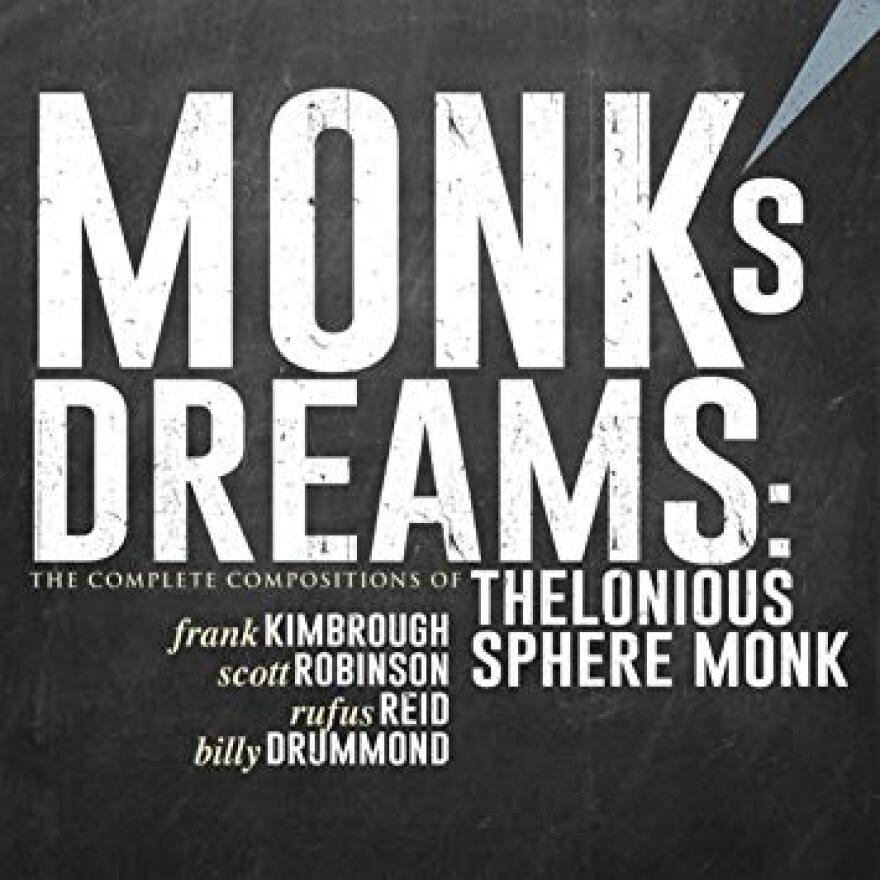Thanksgiving is here — and with it, five new reasons to be thankful.
Frank Kimbrough Quartet, "Stuffy Turkey"
As we've established here before, the ultimate Thanksgiving anthem was recorded by Thelonious Monk in 1964, for his Columbia album It's Monk's Time. The tune, "Stuffy Turkey," is one of his semi-obscurities, though that may be changing. This fine new version is by pianist Frank Kimbrough, leading an ace quartet with Scott Robinson on saxophones, Rufus Reid on bass and Billy Drummond on drums.

The track comes from Monk's Dreams: The Complete Compositions of Thelonious Sphere Monk, a 6-CD boxed set on Sunnyside. As I wrote in the liner notes, the interpretive spirit of Kimbrough's project is reverential but hardly rote, "embodying a Monkish principle of serious play." Did I also mention how swinging the track is? Thanksgiving will have come and gone by the time Kimbrough and company play their album-release gig at the Jazz Standard, Nov. 27 and 28 — so enjoy this tune now, before the tables turn to "A Merrier Christmas."
Harriet Tubman, "Green Book Blues"
If your holiday weekend plans involve a trip to the multiplex, you're likely to encounter the 1960s period film Green Book, starring Mahershala Ali as pianist Don Shirley. The track below, "Green Book Blues," has nothing to do with that, except for the fact that it also invokes The Negro Motorist Green Book, a guidebook for African-Americans traversing the country when Jim Crow was the law of the land.

The members of Harriet Tubman — guitarist Brandon Ross, bassist Melvin Gibbs and drummer JT Lewis — would point out that a lot of things still haven't changed in America. But there's more than simmering rage in "Green Book Blues," a track from the band's deeply immersive album The Terror End of Beauty, which releases this Friday. Listen for the way Ross drapes layers of his sound, atop a rhythmic engine that abruptly shifts gears a few minutes in, suddenly turning harder, more determined. This band means business.
Hedvig Mollestad Trio, "Beastie, Beastie"
Speaking of heavy-gauge trios composed of guitar, bass and drums: Hedvig Mollestad, a psychedelic jazz-rock wonder from Oslo, Norway, just announced a new album, Smells Funny, due out Jan. 18 on Rune Grammofon. Here is the album's playfully gnarly lead single, "Beastie, Beastie."
Mollestad hasn't been shy about naming her guitar influences, at least two of which — John McLaughlin and Jimi Hendrix — surface at times during this track. But the nimble muscularity of her trio, with bassist Ellen Brekken and drummer Ivar Loe Bjørnstad, warrants judgment on its own ecstatic terms.
Anthony Braxton, "Improvisation Eight"
Prolific and irreducible, Anthony Braxton continues his winding path as one of our music's wiliest heroes. Much of the documentation around his music in recent years has focused on his compositions, which continue to strain against every stricture. But Braxton has also continued to work in freeform situations, including the one that yielded his new album, Eight Improvisations (Trio) 2014.

As the title implies, this is a chronicle of spontaneous invention, recorded four years ago with a pair of intrepid partners: cornetist Taylor Ho Bynum, a close confrere, and pianist Bob Bresnan, a newer aquaintance. The album, stretching to an hour and 45 minutes, covers a lot of ground in terms of temperament and tone: sometimes the interaction is bristling, and sometimes it glides. The final performance in the set strikes a meditative chord, with Braxton's alto saxophone perambulations inspiring a thoughtful series of responses from the others. I doubt I'll be alone in hearing a hint of Lee Konitz in the character of this track, though of course Braxton is, now as ever, very much his own man.
Norah Jones, "Wintertime"
"Wintertime" is the latest in a series of standalone singles from Norah Jones, who seems to be enjoying her liberation from the tyranny of an album cycle. She's also clearly enjoying her new collaborators, notably Jeff Tweedy, who cowrote the song and plays guitar and bass on the track, with his son Spencer on drums.
The song sets up a metaphor of the four seasons, with winter's desolation inspiring a specific sense of longing. Jones is right in her element here, mining a sweet sort of melancholy with no more apparent effort than it takes to put on a pot of tea. She keeps apologizing for the inconvenience of her needs, but buried within that thought is an intimate entreaty: "In the wintertime, there's a candlelight / I only get from you."





